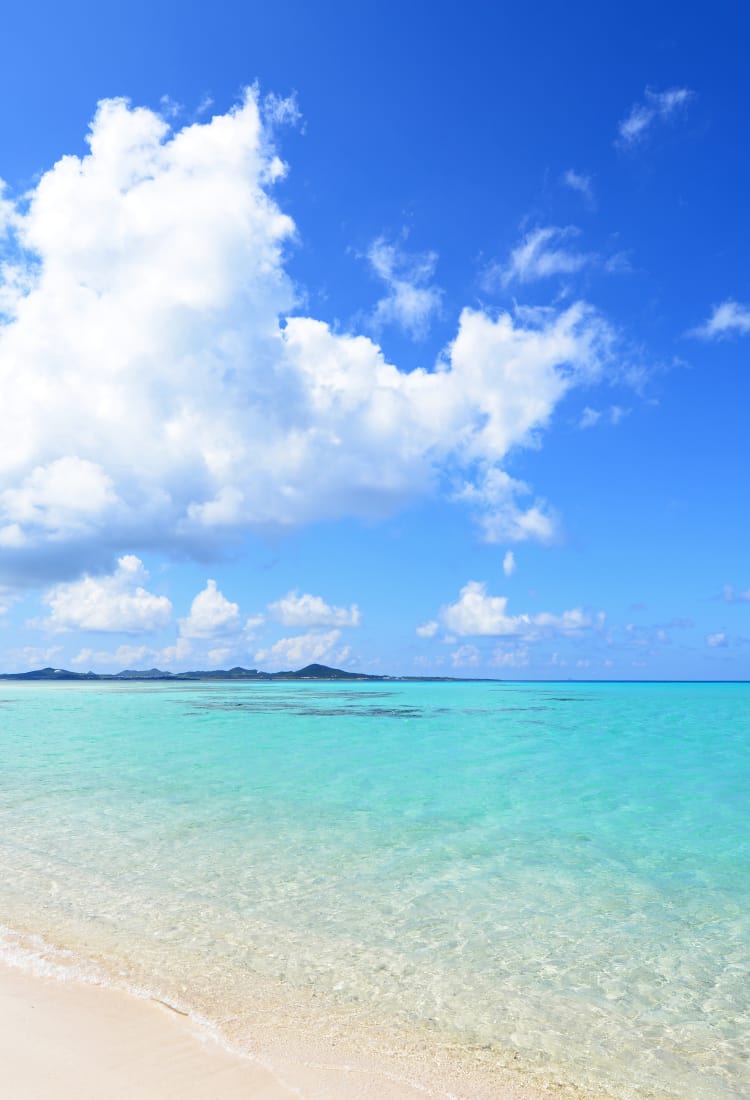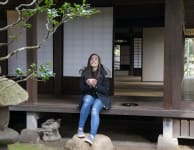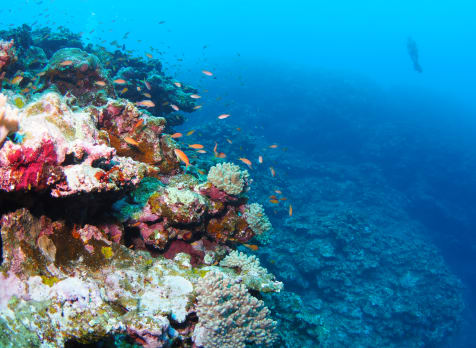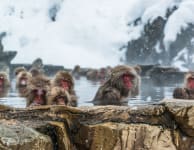Japan's rich culture and diverse natural environment combine to offer everything you need to recharge your batteries
A variety of natural scenery, from the untamed wilderness of Hokkaido to the tropical island paradise of Okinawa , means you don't have to go far to lose yourself in nature. Japan is home to idyllic woodlands, waterfalls, volcanic mountains, tranquil lakes and crystal blue oceans lapping at spotless sandy shores.
Japan also has a deep spiritual side, which makes it a good option for a getaway of mindfulness and self-reflection. Head to a Buddhist temple in Kyoto for a workshop on Zen meditation, or join a yoga retreat in Kyushu to reinvigorate both body and spirit. Of course, no relaxing retreat to Japan is complete without a soak in one of the many hot springs resorts dotted around the country.


Bathing in hot springs is a popular pastime in Japan
Onsen
Onsen (hot spring) resorts are both the ultimate in relaxation and a way to, quite literally, immerse yourself in Japanese culture.
Japan's volcanically active geology means natural hot springs are common, and onsen baths are filled with this water. Bathing is an important part of Japanese culture, making onsen resorts extremely popular. There are a vast number of them throughout the country, with indoor and outdoor baths available. Many onsen have spectacular views of surrounding mountains, beaches or other natural scenery.
Onsen have a relaxing effect on body and mind. They are purported to have a wide variety of beneficial health effects on users, including reducing muscle pain and cleansing the skin. These benefits are partly due to the thermal effects of hot springs, which helps to ease stress, and also due to the water's mineral content.
For the best onsen experience, stay at a ryokan. Many traditional Japanese inns have hot spring baths on site so that visitors can enjoy the onsen alongside Japanese food and hospitality.
Onsen traditionally require naked bathing , so baths are gender-segregated. Many ryokans also offer private onsen for individuals, couples or families. Hot spring baths are not intended for washing, so use the nearby showers before you enter—but not afterward, or you'll wash away all the water's minerals. Then get ready for a pleasant night's sleep.


Work on your meditation practice in one of Japan's Buddhist temples
Mindfulness and meditation
Meditation is a significant part of Zen Buddhism, which teaches that the practice is a way in which we can achieve self-enlightenment. Zazen, a type of Japanese meditation that translates as seated meditation, is the most common type of meditative practice within Zen Buddhism. It involves focusing on the breath as a way to calm the mind.
Some temples in Japan offer meditation guidance and retreats in English. They'll teach you more about Zen Buddhism and zazen meditation techniques, while you experience life in a Buddhist temple.
An overnight stay might include waking up early the next morning for meditation, followed by breakfast and helping out with temple chores. After lunch, there's more meditation—including walking meditation, chanting or yoga—and free time in the evening after dinner. If you are looking for full immersion, some retreats are entirely silent.
If that sounds a bit intense, there are plenty of temples offering day-long courses, or even just one class. Whichever style you choose, you'll find meditation is a fantastic way to relax, improve your mental and physical health, and gain a sense of inner peace.


Japan has a diverse coastline
Beach days
Japan may not be the first place that springs to mind when you think of beach destinations. However, its lengthy coastline offers incredible diversity and is home to plenty of underrated beaches.
Japan has a lot of fantastic spots for snorkeling and scuba diving, the most impressive of which are in the island chain of Okinawa located south-west of the main island. Off the coast of Ishigaki Island , for example, it's possible to swim among colorful tropical fish, coral, and giant manta rays, even if you're entirely new to diving.
Those who prefer to stay on land will still find themselves spoiled for choice, from family-friendly popular seaside resorts to remote beach destinations with beautiful scenery.
Famous beaches include Kaiji Beach on Taketomi Island, known for its star-shaped sand, Kotobiki Beach in Kyoto Prefecture, where the sand sings as you walk on it, and Ibusuki in Kyushu, where you can be buried in volcanically-heated sand baths for ultimate relaxation. Lie back and let Japan's white sand, crystal-clear water, and gorgeous sunsets help you unwind.

Shinrinyoku is an important way to rejuvinate
Forest bathing
Forest bathing, or shinrinyoku in Japanese, is a relatively new concept that originated in Japan in the 1980s and is gaining popularity worldwide. The idea is simple: to consciously spend time in nature, as a way to both relax and improve your health.
This conscious aspect is what differentiates it from hiking. The point is to actively engage all of your senses to soak up the peaceful atmosphere of the forest. From the freshness of the air and the scent of the leaves to the sound of the wind through the trees, you focus entirely on your surroundings—with no distractions from your smartphone.
Forest bathing is not only good for relaxation, but various health benefits are associated with the practice, too. These include lower blood pressure, reduced stress, improved concentration, enhanced mental well-being, and increased energy levels.
With over 30 national parks and around 67 percent of the land carpeted in forest, Japan has many options for shinrinyoku, even in big cities like Tokyo. If you're not sure where to begin, try taking part in an organized excursion with a forest bathing guide who can show you how to get started.


Forests, mountains, lakes and coastline make Japan an ideal place for outdoor pursuits
The great outdoors
Getting out in nature to enjoy the fresh air and scenic views is a brilliant way to relax and escape the stresses of daily life. About three quarters of Japan is covered with mountains, meaning that the opportunities for enjoying outdoor activities are vast.
Hiking is a popular pastime, which is no surprise given the exciting trails found all across the country. Parts of hiking routes began as pilgrimage trails, such as those in the famous Kumano Kodo network. The Kumano Kodo has been in use for over 1,000 years, and their significance earned them a UNESCO World Heritage designation. Autumn is considered the best season for hiking, due to the mild weather and the chance to view the stunning fall foliage as you walk.
When snow arrives, so do winter sports. One of the great places to enjoy snowboarding and skiing in Japan is Hakuba , in Nagano Prefecture in the Japan Alps . This internationally renowned resort was one of the central locations used to host the 1998 Nagano Winter Olympics. The village's exceptional powder snow and abundance of runs mean it's still one of the country's top ski destinations.
Further north, the island of Hokkaido also has world-class ski resorts, such as Rusutsu and Niseko . The prefecture's rugged wilderness makes it perfect for almost any outdoor activity you can think of, from kayaking and horse riding to cycling and canyoning.


Yoga classes can be found in every city across Japan
Yoga in Japan
Yoga is another activity that is enjoying increased popularity in Japan. You'll find yoga studios in every big city, with classes varying from traditional yoga styles to modern variations, such as hot yoga. Some studios offer classes with English-language instruction, making sessions accessible to tourists.
As well as individual classes, there are a growing number of English-language yoga retreats in which you can take part.
For the ultimate detox from modern life, try a yoga retreat held in a Buddhist temple, where you can combine your yoga practice with meditation sessions and other traditional Japanese ceremonies. Alternatively, opt for a retreat at an onsen resort for the utmost in relaxation.





























































